You Can't Overstate The Covid 'Lab Leak' Media Coverage Failure
And you can't overstate its impact, either.
Do you remember the media’s early coverage of the Covid-19 “lab leak” hypothesis, the idea that perhaps the virus that triggered the pandemic was released, accidentally or intentionally, from a lab in Wuhan, China? That idea, since deemed the “most likely” explanation of Covid’s origins by the Biden Department of Energy, was rejected out of hand by countless outlets in mainstream media in 2020 (and beyond).
For my money, it represents perhaps the worst, and most consequential, failure of mainstream media coverage in recent memory.
So I revisited it, and it was worse than I remembered.
Media Coverage: One early moment that I suspect stuck in a lot of peoples’ minds was when Senator Tom Cotton (R, Ky.) suggestion in February 2020 that the virus could’ve leaked from a lab in Wuhan, rather than evolved from nature.
The media response was swift and aggressive. The Washington Post, in a since-updated piece that originally bore the headline, “Tom Cotton keeps repeating a coronavirus conspiracy theory that was already debunked,” claimed that merely asking questions about the biolab in the town where cases were first discovered was “fanning the embers of a conspiracy theory that has been repeatedly debunked by experts.”
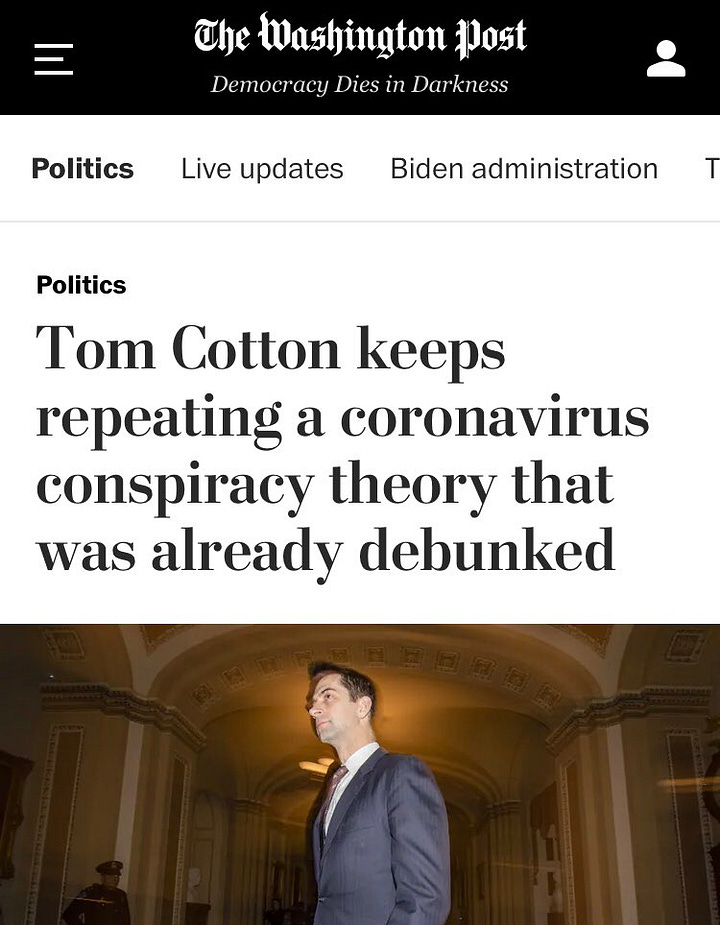
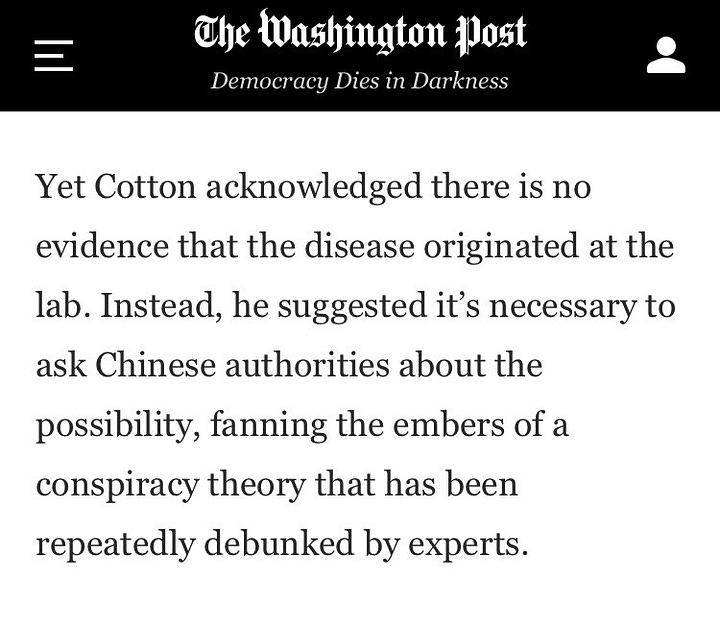
(The url for the updated piece still points back to the Post’s initial claim.)
And it wasn’t just the Post who wrote off Cotton’s suggestion that we try to get the facts.
The New York Times wrote off the idea as a “fringe theory” “dismissed” by “scientists” that was only gaining attention because it was “the kind of tale that gains traction among those who see China as a threat.” All that before the first actual word of the piece.
Likewise, CNN said Cotton was “playing a dangerous game” with his theory, pointing to a “fact check” the outlet had printed citing an expert who said “you can draw a line through” Cotton’s claim about the virus’s origin “and say that didn’t happen.”
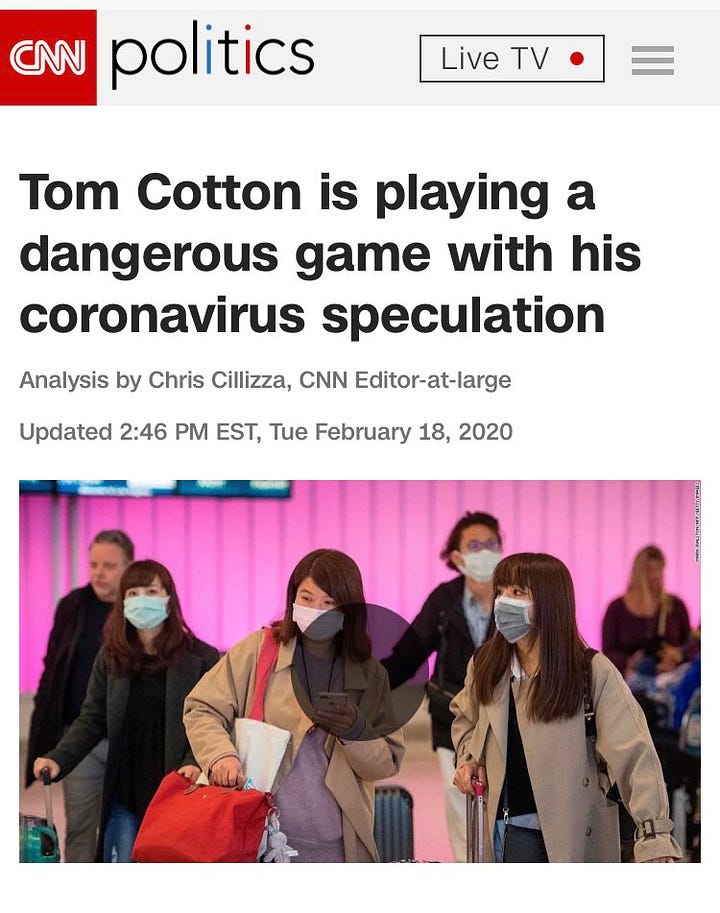
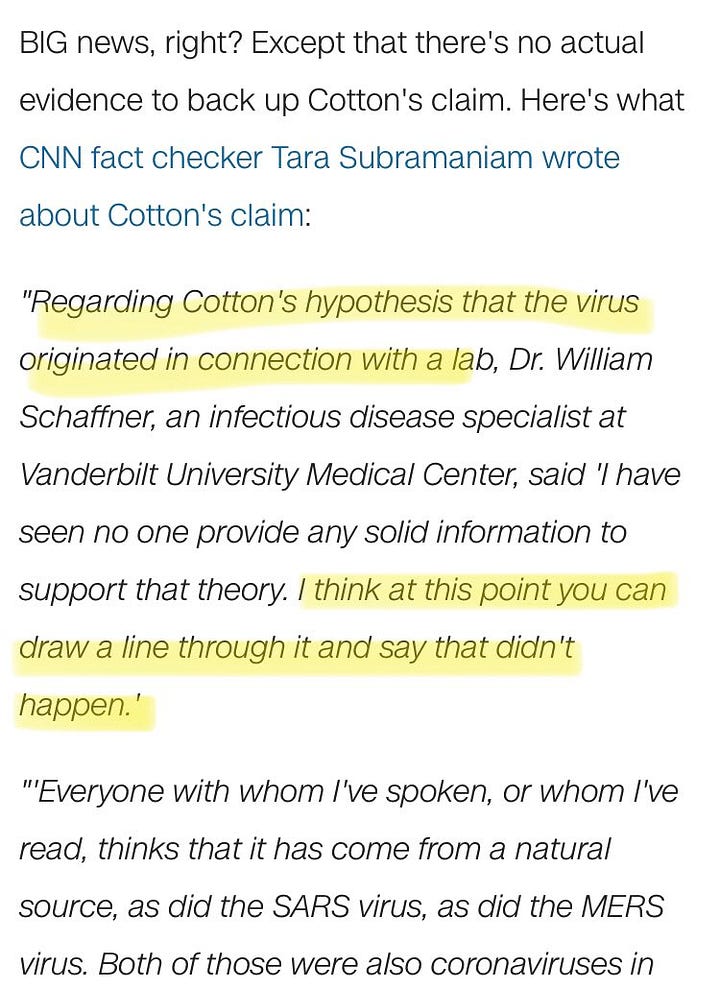
USA Today went the fact-checking route, too, ruling Cotton’s suggestion “false” in a since-updated article. The piece calls the claim that Covid “may have originated in a research laboratory in Wuhan, China” was “[o]ne of the most prominent examples of false information about the virus.” The outlet quietly upgraded Cotton’s claim to “partly false” in February 2021, as investigators learned more. More on that development later.
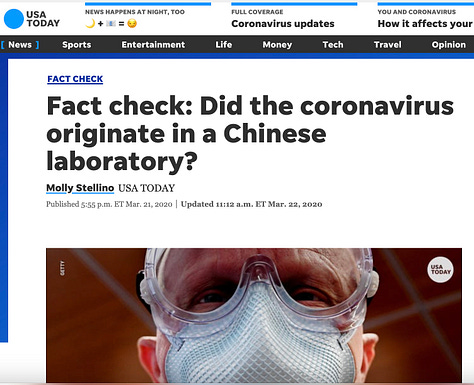
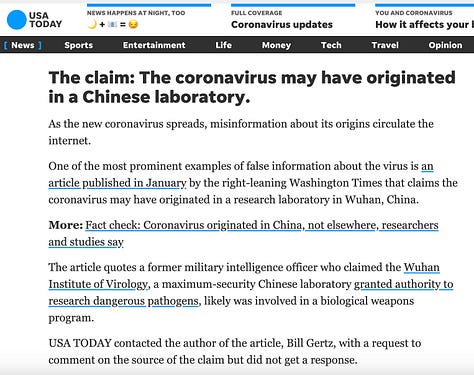
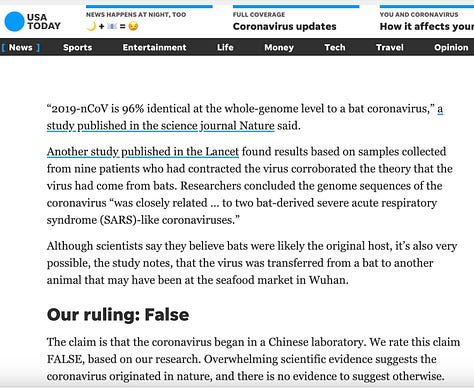
Perhaps nothing drove the press’s incuriosity about the lab leak hypothesis more than the fact that former President Donald Trump was promoting it in early 2020, often in less-than-delicate ways. A New York Times research article blamed Trump for the “infodemic” around coronavirus, including conspiracy theories and other supposed disinformation surrounding its origin. Vox included Trump’s theory in their “debunked” list of coronavirus origin theories. Even after a round of stealth edits were made to the Vox piece in May 2021 to rein in some of its conclusions, the article calls the lab leak hypothesis “a dangerous conspiracy theory” that “won’t die.”
Other outlets followed suit, including Vice, Al-Jazeera, Guardian, CNN (times two), and Business Insider.
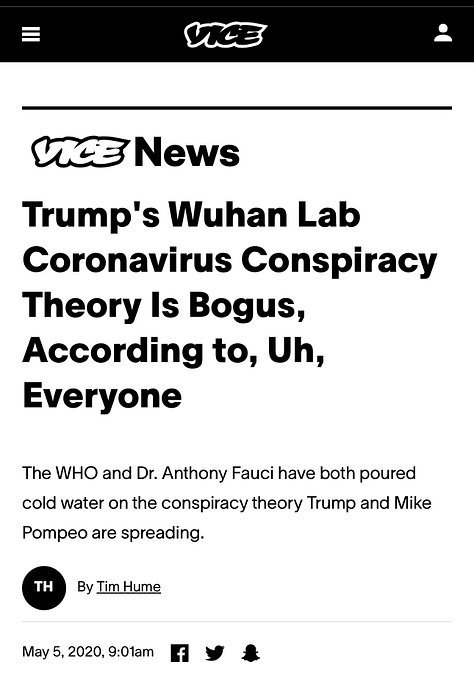

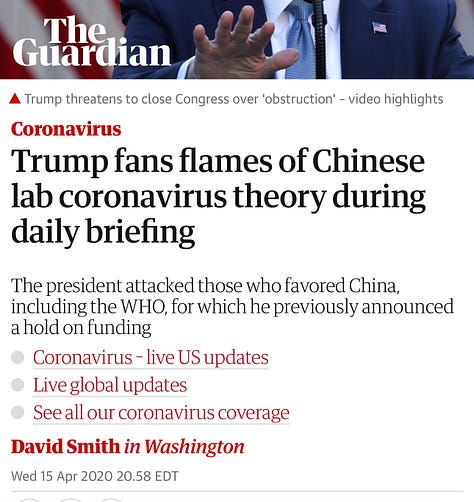
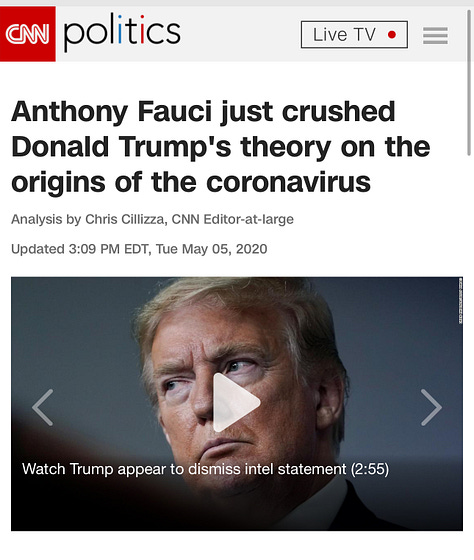
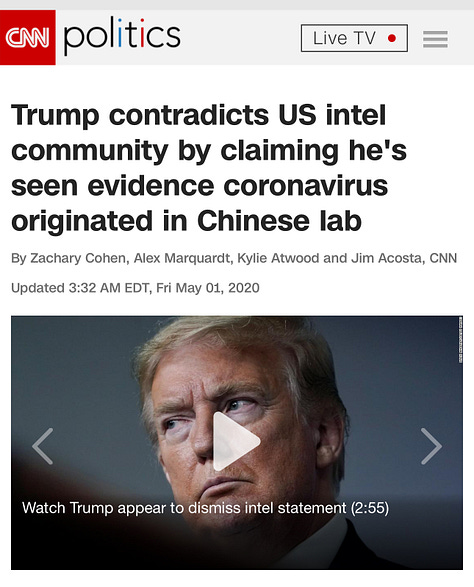
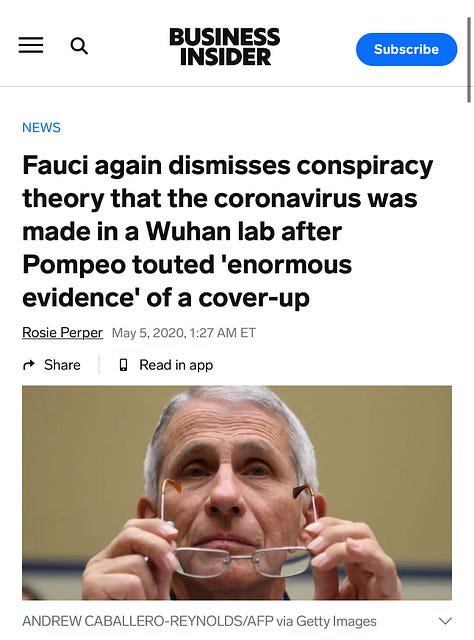
Trump took to referring to Covid as “Wuhan flu” or “China flu,” both of which the press deemed were racist, even if the press had been calling the virus “Wuhan coronavirus” or “Chinese coronavirus” mere weeks before.
MSNBC’s Chris Hayes recorded a jeremiad about conservatives using the “escaped from the lab” theory as an excuse for Trump’s response to the virus in May 2020. Rather than look into the theory, he suggested Trump’s team was “desperately grasping at straws” and had made the idea up as a “scapegoat.”
But the media’s outrage about this latest “conspiracy theory” wasn’t just tied to Trump. Anyone who suggested that someone should look into the Level 4 biolab that was doing research into coronaviruses jumping from bats to humans for a shady authoritarian regime down the street from where the first human coronavirus cases showed up (map below) was a dangerous proponent of disinformation, according to the mainstream media.
Perhaps no outlet distilled the disdain many in the media had for those who gave the lab origin theory credence better than a still-unedited ABC News headline from March.
An NPR “All Things Considered” podcast episode titled, “Scientists Debunk Lab Accident Theory Of Pandemic Emergence” leaned heavily on the idea that the science was settled. Since Covid-19 was discovered, “scientists worldwide agree[d] that the virus occurred naturally,” the host, Ailsa Chang, would go on to say. The podcast episode and accompanying piece are still online without edits or editor’s notes.
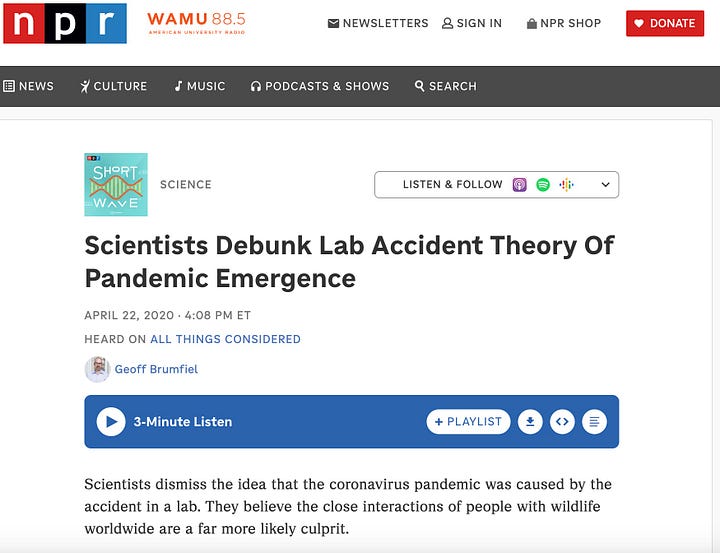
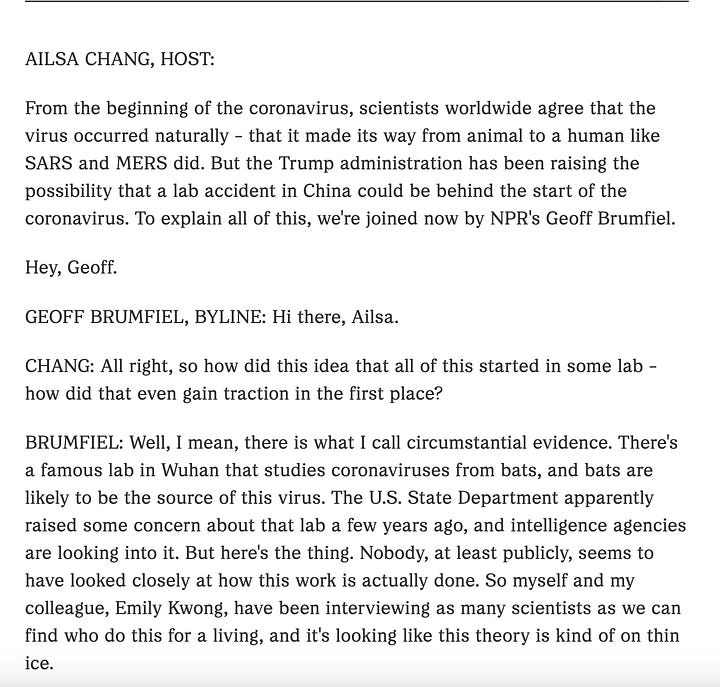
A CNN Health piece lumped in the lab leak theory with other “bogus claims, conspiracy theories and misinformation about the disease.” Once again, “scientists” were cited to definitively reject the claims. The takeaway (or, as the outlet called it, “reality”) was that you can’t “believe everything you read on the internet.”
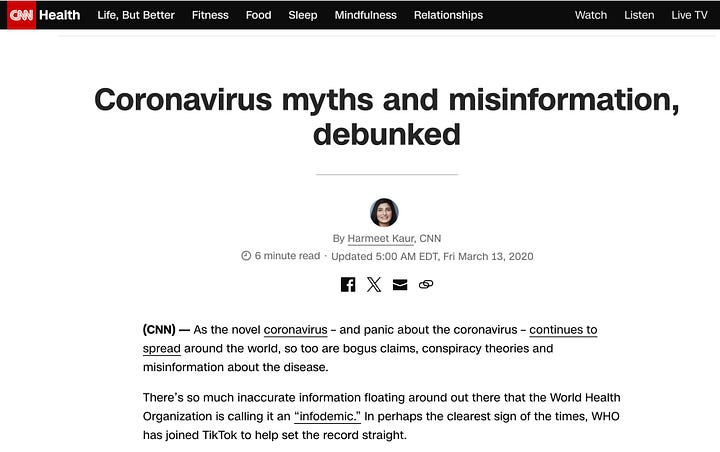
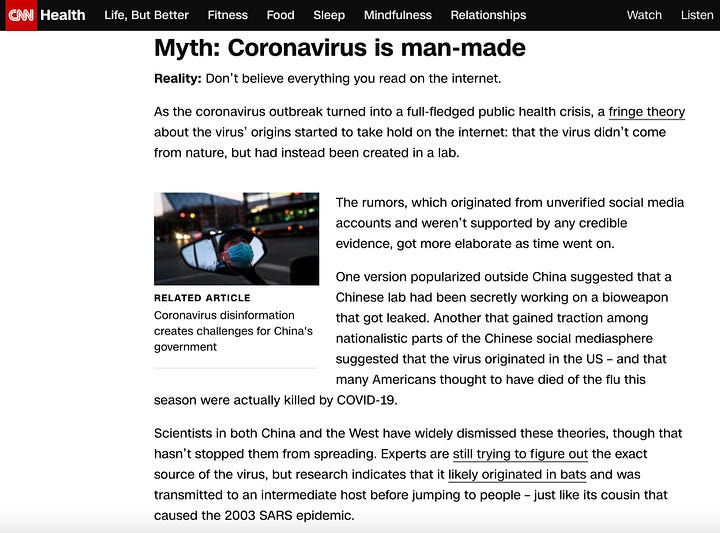
The experts had spoken, the media breathlessly explained for months in early 2020: the lab leak theory was a conspiracy. The prevailing theory of animal outbreak was beyond questioning, a law of science, like gravity or thermodynamics. The virus started in nature. Here are just a few headlines, from Forbes, National Geographic, Washington Post, CBS News, Financial Times and Science News.

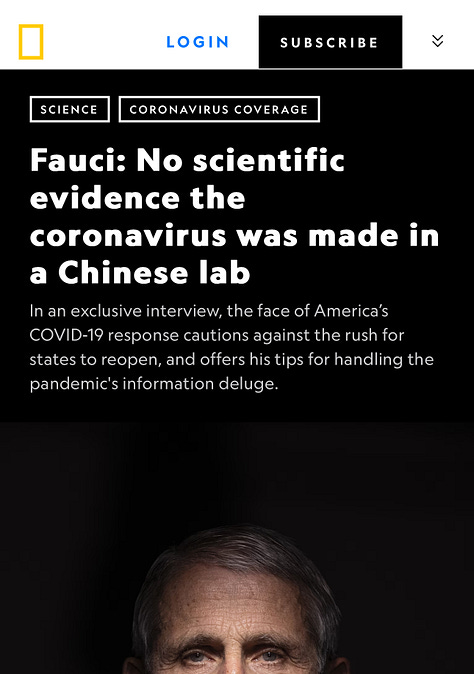
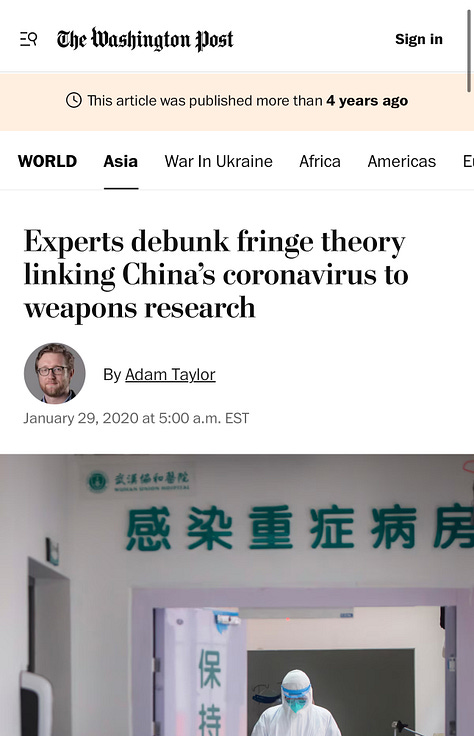
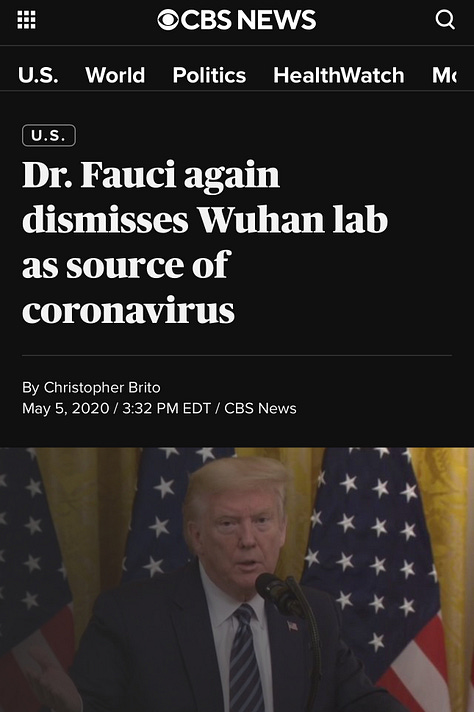

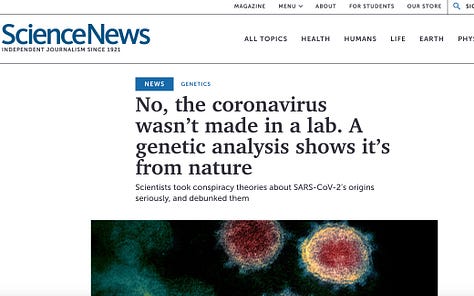
When a poll released in early April 2020 found that 30 percent of respondents thought the lab origin theory was plausible, outlets seemed to climb over one another to castigate the rubes who would believe the conspiracy theory and those charlatans (primarily on the right) who would dare suggest it. Below are headlines from Forbes, The Hill, Vox, Guardian, CNN, and Daily Mail.
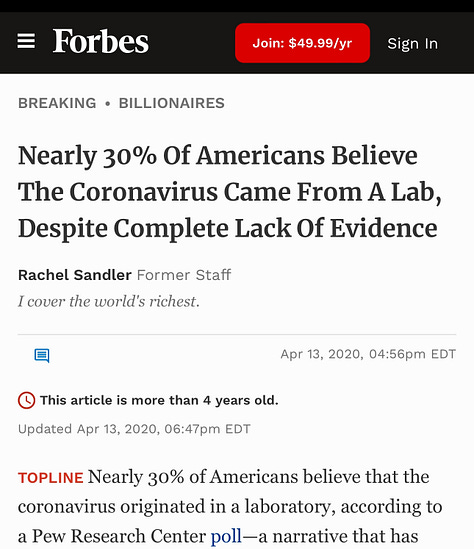
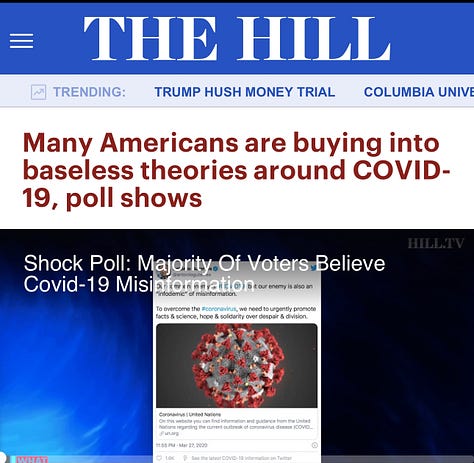
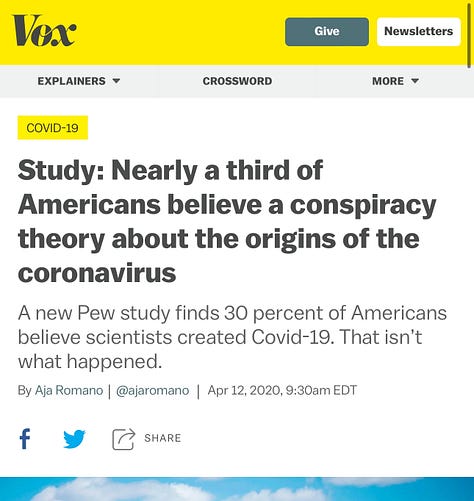
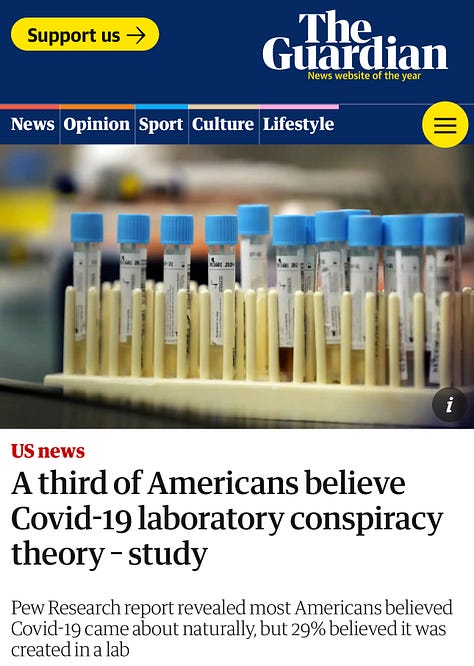
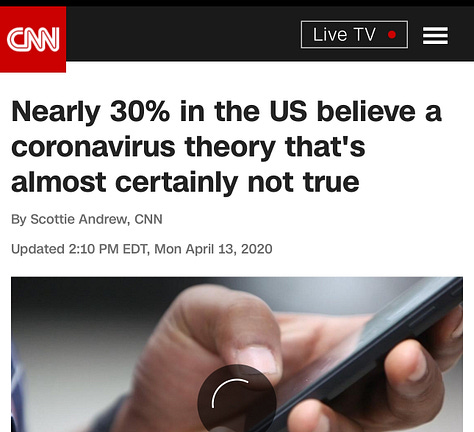

At a time when the press and Democrats appeared primarily concerned about not offending Asians, the media were quick to accept Chinese denials unchallenged. The media could have treated China as a hostile power who had long played fast-and-loose with the truth and might be doing so again about the biggest story of a generation. Instead, they took China’s denials at face value, just as believable as denials from the United States. Outlets including TIME, CNN and the New York Times concluded that it was merely a “blame game” with two equal powers tossing allegations around.
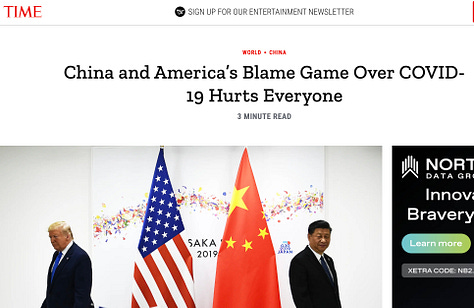
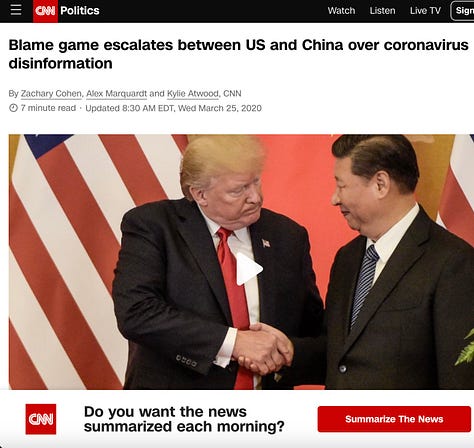
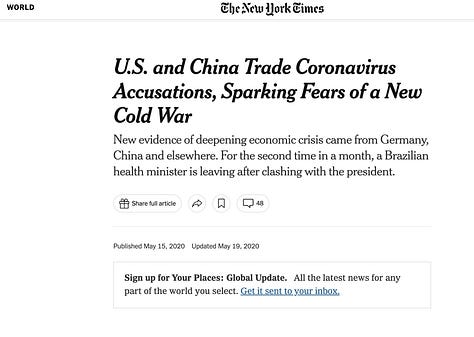
One moment from all this that you may have forgotten: In May 2020, Trump cut U.S. funding for the lab in Wuhan, China that had allegedly been conducting bat-based coronavirus “gain of function” research, potentially making the virus more potent and more likely to spread to humans in violation of U.S. protocols. This was the same lab, the Wuhan Institute of Virology, where many alleged the virus had originated. Typing out those sentences, it feels self-evidently obvious that it was a good time to stop giving the lab American taxpayer money. But the press didn’t think so.
Politico and NPR pointed to “conspiracy theories” tying the lab to the pandemic’s origin and bemoaning the damage done by cutting U.S. funding. CBS News said Trump’s politicking and dishonesty would “jeopardize” a cure for the virus.
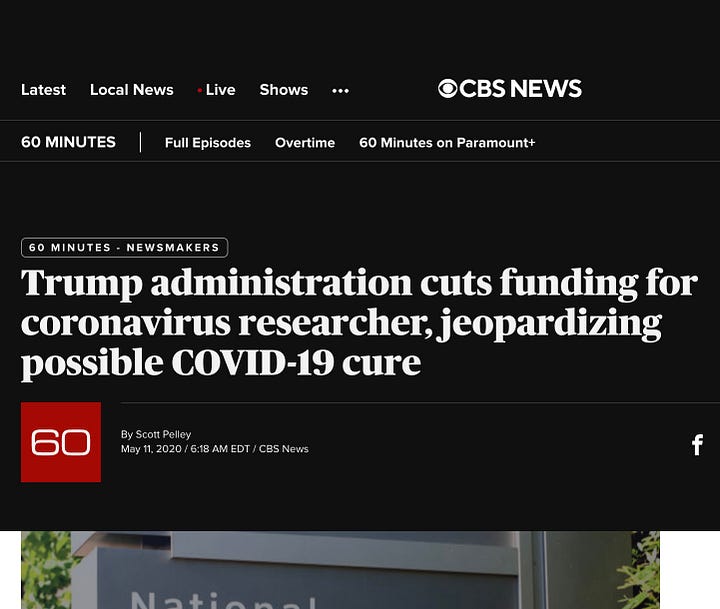
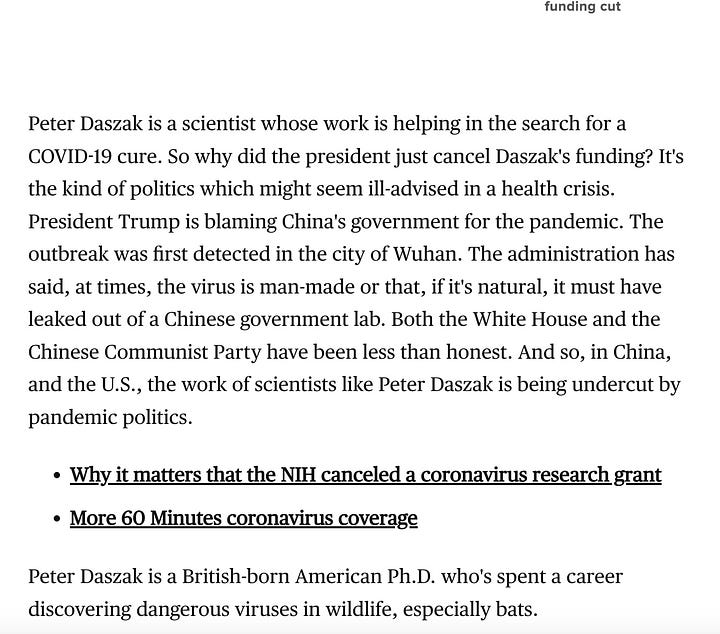
Outlets simply couldn’t abide that stopping payments to the foreign lab that may have killed millions was reasonable. ABC News said the lab lost funding because it was at “the heart of conspiracy theories” about the virus’s origin. Vanity Fair blamed “right-wing disinformation” for the decision. The New York Times went back to an old stand-by and said that scientists were outraged by the move.
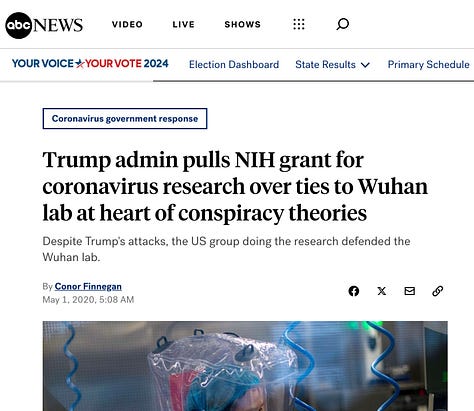
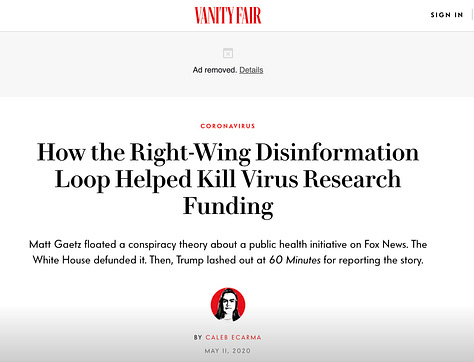

The conspiracy claims continued. In December of 2020, the Associated Press included a possible Chinese lab origin of the virus in its rundown of coronavirus conspiracies titled, “Debunked COVID-19 myths survive online, despite facts.” The lab origin idea was a “myth” and a “conspiracy theory,” AP said. The real origin “was far less scandalous:” It started in nature.
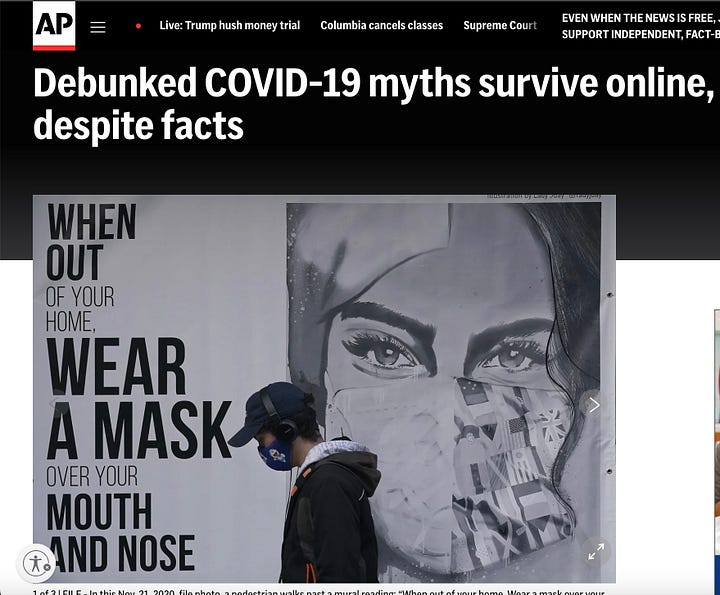
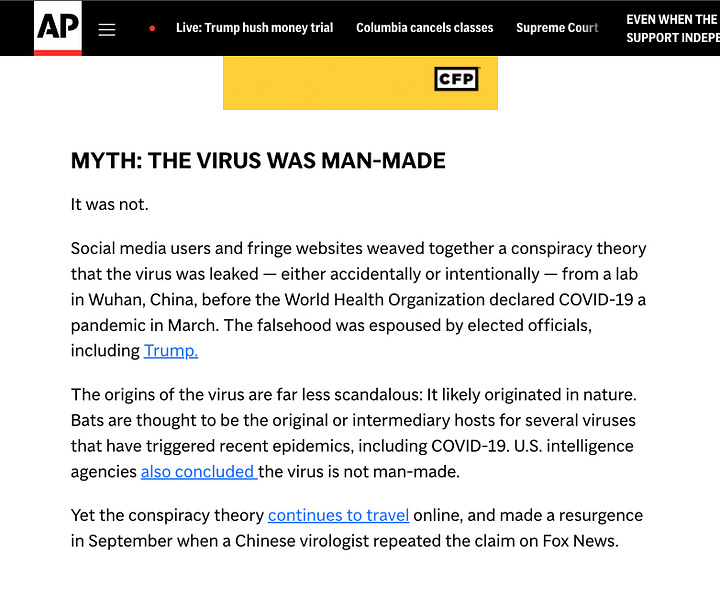
In retrospect, perhaps NPR was on to something with this historical parallel. Just not the way the story suggests.
The facts: Over time, the evidence that the lab leak theory of origin as at least plausible started to leak out.
In 2021, a former New York Times science writer, Donald McNeil, published a piece on Medium explaining his change-of-heart about the lab leak theory: While he understood the initial opposition, he thought the idea needed to be taken seriously. It opened the door for more mainstream outlets to consider the possibility that they had gotten the story wrong. The full piece is well worth your time, and can be found here. More nuanced pieces about the lab leak hypothesis in the Washington Post, Politico, and Axios came thereafter, conceding that there was a debate worth having and the lab origin was “credible.”
But many outlets continued to resist the idea. Then a letter from leading scientists calling for further investigation into Covid’s origins broke down much of the lingering skepticism. A thoughtful explainer updated at the end of 2021 from none-other-than the New York Times provided an accurate summation of what we knew then:
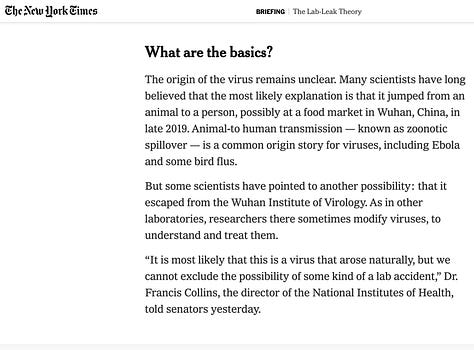
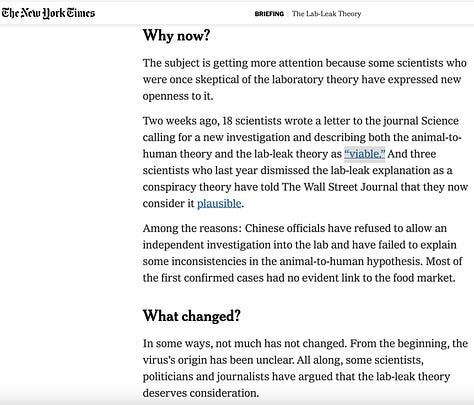
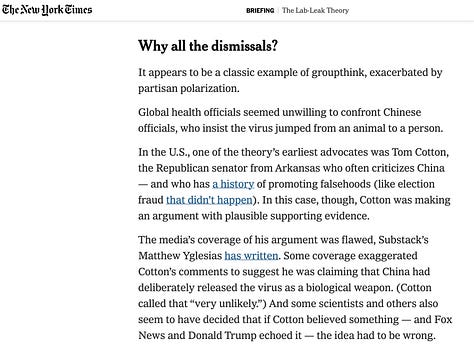
Then in February 2023, the Biden Department of Energy announced that they had concluded that a leak from a lab, in the words of the New York Times, “most likely” caused the outbreak of Covid-19. The media had little choice but to concede that the understanding had evolved. It created some tortured side-by-sides of media headlines still up from 2020 with the new news.
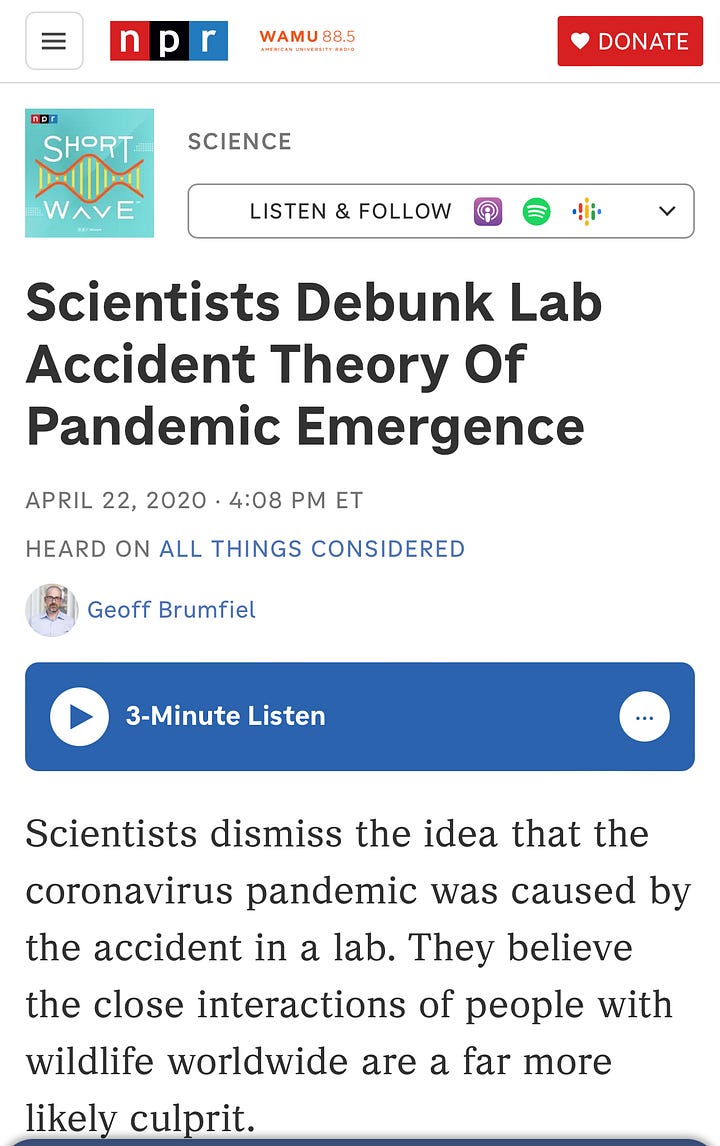
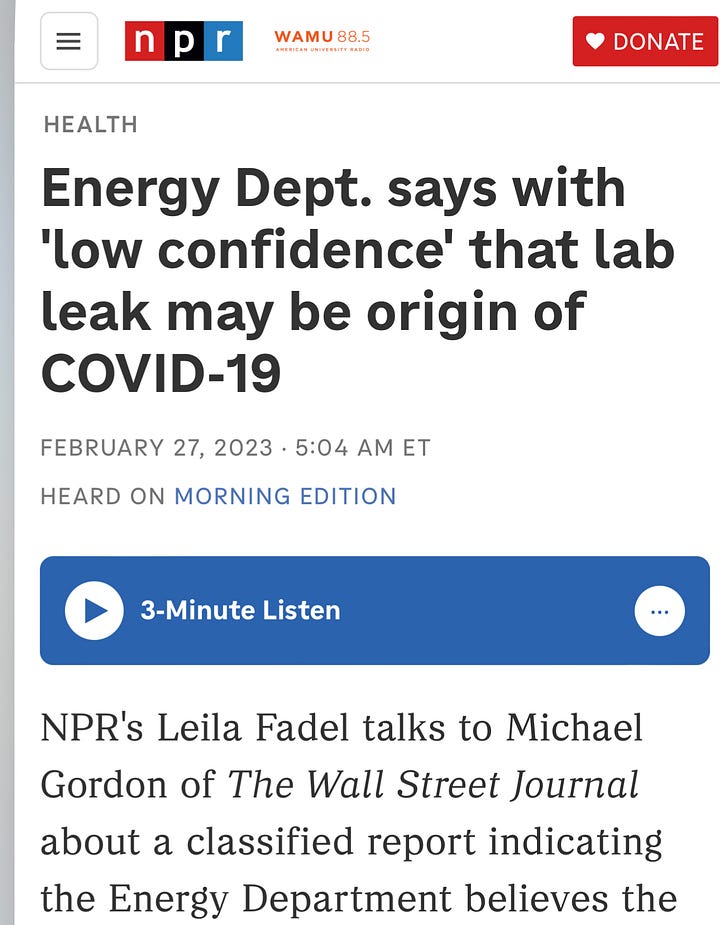
To be sure, there were wild conspiracy theories about the virus floating around at the time, from claims that 5G was responsible, to bogus treatments and insistences that the virus was a hoax, to allegations from China and Russia that the United States had created the pathogen.
But the media took an idea they thought reeked of xenophobia, promoted by their worst nemesis and his allies, and lumped it in with those absurd theories, not stopping to consider the theory on its merits.
Why it matters: While some of the media coverage has since caught up with the facts as we knew them all along, time has likely buried some or even all of the evidence from Wuhan.
On perhaps the most important story of our time - what caused the outbreak of a global plague - the media, in unison, abandoned their role of neutral arbiters of information for the sake of partisan expediency.
And by doing so, they leave the world more poorly equipped to handle the next pandemic.
Regardless of the true origin of the virus, the media’s role in stunting the investigation into a potential leak guarantees a loss of knowledge. And it makes it easier for those who might have something to hide - in China or, perhaps, closer to home - to do so.
My two cents is that the media were too focused on a crusade to debunk Trump’s every word and saw the lab leak as just another bogus Trump story, regardless of how believable it may have sounded otherwise or who might’ve seen it as credible. Trump and those who like him say X, and therefore X must not be true.
It was also a vivid example of the media’s over-reliance on self-selected experts whose opinions lined up with their own (and, invariably, opposed Trump’s). This newsletter will continue to focus on how this issue has plagued other aspects of media coverage that intersect with partisan touchstones.
The problem wasn’t just inaccurate coverage. This reporting gave cover to social media companies to censor content the press had claimed was harmful disinformation. For months, the digital conversation on the most popular social platforms about a plausible origin theory of the global pandemic that had the world shut down ground to a halt. Not only did the media help bring those decisions about, the press celebrated the censorious decisions when they took effect.
It can’t be overstated not just how bad and blinkered the coverage was. But the deleterious impact to our collective understanding of the biggest (and still ongoing) news story in decades, and the rough first draft of history written about it, can’t be exaggerated, either.









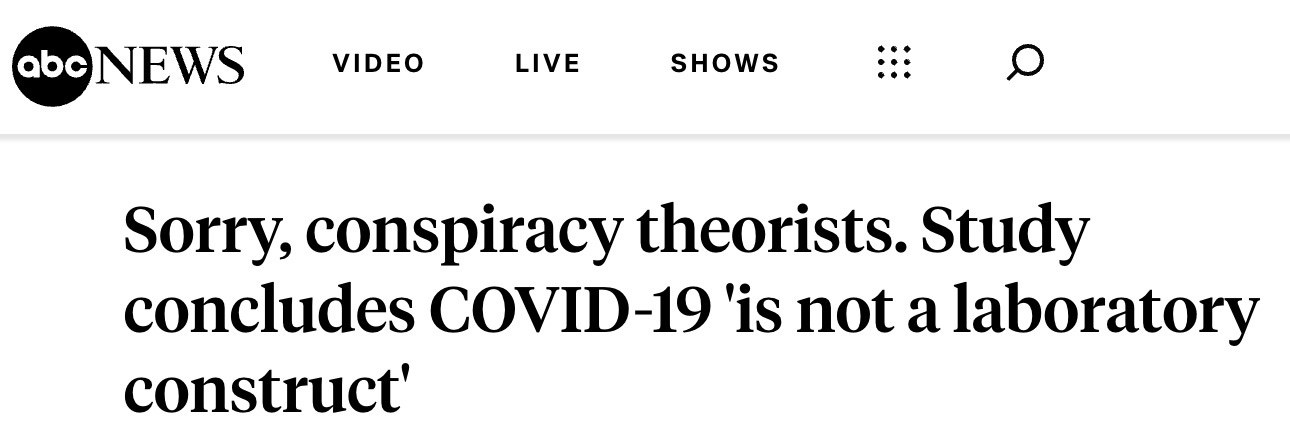




You are providing a real service by screenshotting so much of this before it succumbs to stealth revisions and/or link rot. Never forget.
Covid was that special time when journalism, sociology and poly-sci majors suddenly made themselves experts in immunology, epidemiology, biology and chemistry.